Copyright © James Boyk 1991-2001
Fall Term, 2002 - the 24th year of this course at California Institute of Technology
"Projects in Music & Science," EE/CS 107a, EE/CS/Mu 17a
Information for Students, Partial List of Requirements (Subject to Changes and Additions)
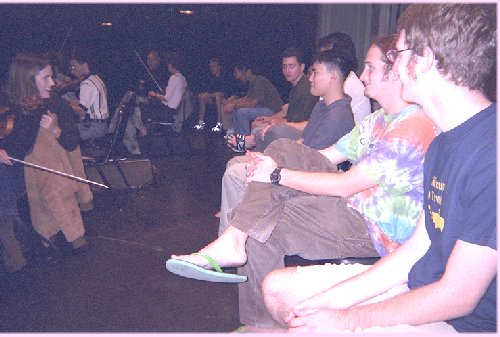
Last Modified: October 13, 2002. Sections modified are marked by *. The last of these is the 5th meeting.
*Note 1: You can enroll in this course in two different ways, as shown above. Moreover, while the course has historically been P/F, it is now possible to enroll for a letter grade in some of these options. NB: The Registrar's Office informs me that that the course may be taken P/F by everyone except those in E&AS options. However, it is the student's responsibility to be sure that the course satisfies needed requirements; to enroll in the correct course; to enroll appropriately for letter grade or P/F. If you have questions, consult the Registrar and/or the relevant Division at the beginning of the course. Do not leave it to be sorted out later.
*Note 2: The description below is what we did last year. It will be modified as we go to reflect this year's activities.
Note 3: Read everything here before the second meeting.
Subject of this term: Analytic listening to live and reproduced music.
Theme: Comparisons focus perception. Thus, on the first day, students will compare the instructor's voice heard live in the classroom to the same voice reproduced via microphone and loudspeaker from the adjacent room. On other occasions, students will compare the sound of the Pasadena Symphony as heard from on-stage to the sound as heard from the hall; the sound of the Dabney Lounge piano live to the same piano recorded; the image and "stereo stage" of an orchestral recording made with "single-point" miking to a parallel recording which was "multi-miked"; and so on.
Because it's difficult to talk about these matters without some understanding of music and performance, basic instruction in these subjects is provided. Also included is information about the basics of the piano; about microphones and stereo; concert-hall acoustics, and other topics.
Discussions of various technologies will be held as needed; e.g., on the tonal qualities of various makes of piano (Yamaha vs. Steinway vs. Boesendorfer); the relative virtues of various kinds of microphones; tubes vs. transistors; analog vs. digital recording; and so on. The focus, however, will always be on having students listen to and evaluate as much live and reproduced musical sound as possible.
The instructor is known internationally as a concert artist and recording engineer/producer, audio consultant, researcher, writer and teacher of this course and of music performance.
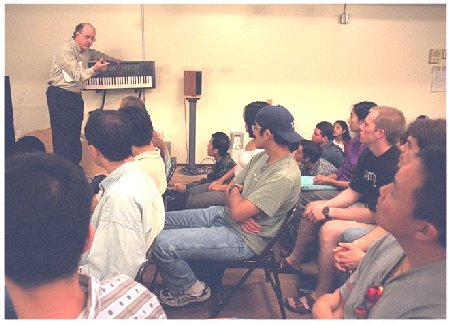
Mottos of the Music Lab:
1. Perception Precedes Analysis; Analysis Informs Perception.
2. When you can reliably tell two things apart, then you get to have an opinion on which is better.
Class meeting times and locations: Weds., Fris., 11:00 a.m. - 12:15 p.m. in the Music Lab, Winnett Center basement, rooms 2C and 2D (access via outdoor stairways on west side of building). Attendance is required in class and on field trip(s).
Auditing: Requires written permission of instructor. Due to severe limitation on facilities, permission will generally not be given.
Instructor: James Boyk. I am available before or after class, or whenever I'm on campus; by email; and by phone to x. 4590 (lab); home phone 310/475-8261 (OK to call Sun. through Fri., Noon - 5 p.m., or any time in an emergency).
Teaching Assistant: Leon Bellan '03. TA's sessions meet twice weekly at mutual convenience of TA and students.
Class Meetings
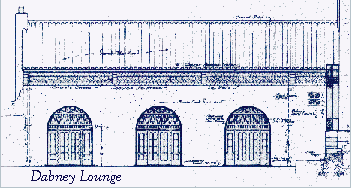
(References to "early birds" mean material provided for those who arrive before class begins. The same material is repeated in class, and is also available to students during the TA's two sessions each week.)
-
*1st meeting - Wed., Oct. 2:
- Compare instructor's voice heard live to same voice heard via microphones, amps and speakers from adjacent room.
- Audio gear and sound reproduction are not our subjects; they are tools to help focus our attention on live musical sound and the role it plays in music's meaning.
- Ask about the students? Majors? Years? Instruments played?
- Description of two-sentence listening reports. (See below.)
- Scheduling of TA's sessions and other organizational matters.
- Assignment: Two-minute recording. Using one of our two MiniDisc recorders and stereo microphones, make a 2-minute recording of anything you wish, the recording to be heard and judged by the class as a whole, with prizes awarded for the best. Blank disks will be supplied. Read the equipment manuals. Replace batteries when needed; bring the receipt for reimbursement. If you do not want "automatic gain control" (AGC), you must turn it off every time you go into "Record." Protect recording from accidental erasure using the record-protect tab. For assistance, contact instructor or TA.
- Assignment: Submit five readings of sound levels. Using a Radio Shack sound level meter (we have three), measure five different sounds, each one on both "A" and "C" scales (total of 10 readings). Turn in a list identifying the sounds and their levels and saying when and where you measured them, and whether you used Slow or Fast meter response. That is, the top line of your chart might read: Sound / Where / When / dBA / dBC / Slow or Fast? (If you're interested in acquiring one of these meters for yourself, it's the "Analog-Display Sound-Level Meter", Cat.#: 33-2050, list price $39.99. I strongly recommend that you not get the digital version.)
-
*2nd meeting - Fri., Oct. 4:
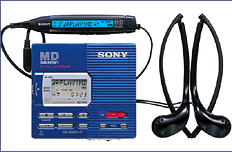
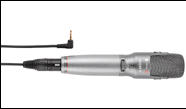
- First two-sentence listening report due. Discuss.
- Ear-training & singing: Use HP spectrum analyzer for skills of matching pitches & singing harmonics.
- Introduce Stereo miking demo recording.
- Field Trip this coming Tues. evening to Pasadena Symphony rehearsal. Listening report for next Wed. must be on this rehearsal. You can get credit for 3 reports by also attending the concert and writing up rehearsal and concert together; in this case, you may use four sentences.
- Administrative:
- Make sure roster is complete and that everyone received emails from Bellan & Boyk.
- Registrar's office states that all options except E&AS may take course as Pass/Fail, but each student must make sure for him- or herself.
- Assignment: dB Quiz. Due at 3rd meeting. Read the explanation of decibels and turn in the answers to the questions. Also submit an additional question and its answer. Prize for most amusing but still legitimate one.
- Assignment: Singing pitches and harmonics.
- Sing the pitch of a note you hear that is in your range.
- Sing a note of your choice, and its 2nd and 3rd harmonics.
- Pass this test or ask JB for help by the 4th class. <-bk/ul>
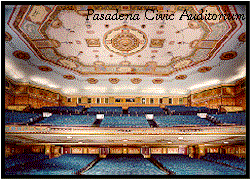
-
7:00 p.m., Tuesday, October 8, 7:05 p.m.: Field trip to Pasadena Symphony rehearsal. (Details near bottom of this page.)
-
*3rd meeting - Wed. Oct. 9 (Music Lab & Dabney Lounge):
- 2nd listening report due. Two reports can get you credit for 3. See description of "Two-Sentence Listening Reports", near bottom.
- Quiz on decibels due.
- Topics in class:
- "Tell me about it" (Last night's visit to orchestra rehearsal.)
- Students read aloud their "additional questions" for dB quiz, then turn in quizzes.
- Move to Dabney Lounge.
- Introduce harmonics on the piano.
- Introduction to Keyboard Skills. (Find middle C on keyboard. Given a note, play the note 1/2-step higher or lower. Given a note, play the note 1 step higher or lower.)
- Discussion of listening reports submitted so far.
- Assignment: In preparation for the next meeting study writeup of a deceptively simple-looking technique for improving your writing.
- Assignment: For the 5th class, be able to play the major scale on any given note, naming the notes correctly. (See explanation.)
- Make an appointment with me if you need help!
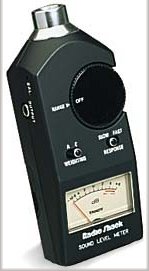
- *4th meeting - Fri. Oct. 11. Workshop on a simple but powerful editing technique that lets you be confident you're improving anything you've written. In preparation, work through the writeup. Use this technique on everything you submit from now on, and submit everything in the "7 words per line" format. Submissions not in this format will not be accepted.
-
*5th meeting - Wed., Oct. 16 (Music Lab & Dabney Lounge):
- 3rd listening report due.
- Topics in class-
- Early birds: What aspects of musical performance are the most important carriers of emotion?
- At concert piano in Dabney Lounge:
- Free-hand graphing of 3rd and 5th harmonics heard within single piano notes.
- Spatial "image" of piano in three dimensions.
- Quiz preparation:
- The piano itself (length of concert-grand; names of important parts; numbers of strings per note; mechanical action of pedals and sonic effect of each; frequency range of fundamentals).
- Playing the piano ("escapement" action; number of variables in control of performer).
- Listening to the piano (duration of bass note, parts of a single note and character of each part; complex nature of each single note, and how we showed this experimentally; mutual relation of elements of each tone; which element is perceived as the pitch?; what aspects of music performance are the most important carriers of emotion?; what is the spatial "image" of a grand piano?).
- Recording the piano (What is the fundamental reason for preserving the "image"? If a pianist makes a recording in a "dry" [non-reverberant] studio, what is wrong, musically, with the producer's adding reverberation after the fact?)
-
6th meeting - Friday, Oct. 18:
- By this meeting, you must have taken (not necessarily passed) the test showing that, on musical material of your own choice, you can tell when the volume is changed by 10 ± 2 dB. The phrase "± 2 dB" means that anything between 8 and 12 dB counts as correct. Passing grade is 5/5.
- Topics in class:
- Early birds: Hear cardioids
- Handout: Booklet of stereo miking demo CD.
- We will go over the skills you must pass by the 8th meeting.
-
7th meeting - Wed., Oct. 23:
- 4th listening report due.
- Topics in class-
- Early birds: Play Piano recordings with good vs. bad image. (Two direct-disk Lp's.)
- Instructor moves around class while covering routine administrative matters. Then point out that students have been turning their heads to follow instructor's location. Why is it important to locate a sound source? And therefore, why is it important to preserve the "image" in recording?
- Listen to two piano recordings and compare the imaging of each to the other and to your memory of live piano.
- A pianist makes a recording in a very "dry" (non-reverberant) studio. The producer adds reverberation to the tape to give a more "live" sound. What is wrong with this, musically speaking? The feedback loop of performer, instrument, room and audience.
- Introduction to microphones. Let's design a mike! How can we change acoustic energy to electrical energy?
-
8th meeting - Fri., Oct. 25:
- Before this meeting, the 10 dB listening test must have been passed, and also the following:
-
Keyboard Skills
- Find middle C on keyboard.
- Given a keyboard note, play the note ½-step higher or lower.
- Given a keyboard note, play the note 1 step higher or lower.
- Given any note on the keyboard, play its major scale naming the notes correctly. (Explanation.)
-
Singing Skills I
- Hear the note I sing and sing the same note.
- Sing an octave higher, an octave lower.
- Sing up or down a half-step, up or down a whole step.
- Given a note, sing its 1st, 2nd and 3rd harmonics. We will use the spectrum analyzer to help with this.
-
Keyboard Skills
- Topics in class--
- Early birds: Play "Art of Fuguing" albums to compare multi-mike & single-mike orchestra recording.
- More about microphones. (Continuation from previous class.) In sum, there are many different ways to make a mike, and different mikes are not equivalent. Anecdote about Kodo drums destroying diaphragms.
- Characterize mikes two ways: by transduction method and by "polar pattern." Transduction method: Dynamic, Condenser. Ribbon is subset of Dynamic.
- Pattern: Convention is that we're looking down on the horizontal plane. Pattern is shown as polar plot. Possible patterns form a continuum from omni (r = k) at one end to figure-8 (r = k cos theta) at the other, with cardioid in the middle (cardioid = omni + fig.-8 = k [1 + cos theta]).
- Three-dimensional patterns: What is the 3D shape of an omni pattern? Cardioid? What pattern has a plane of null?
- Basics of stereo.
- "Single-miked" vs. "Multi-miked."
- Compare two direct-disk piano Lp's, one multi-miked, the other single-point miked.
- Before this meeting, the 10 dB listening test must have been passed, and also the following:
-
9th meeting - Wed., Oct. 30:
- 5th listening report due. Minimum of 4 reports must be submitted by today.
- Piano quiz due. (Note: The material for the last two questions of quiz will be covered in class starting at the 7th meeting.)
- Topics in class:
- Early birds: Hear Sheffield Lab "Confederation" Lp, note transparency and resolution of sound, convincing quality of image and "stereo stage" of this direct-disk Lp.
- Play two students' two-minute recordings.
- Microphones: Define self-noise. A mike shadows itself more and more with respect to sound from behind as the frequency gets (higher, lower)? What's the advantage of a null plane for recording in small rooms? Microphones with large diaphragms suffer from off-axis anomalies. Why? Will the anomalies be worse at low frequencies or high? What about ribbon mikes from this point of view?
- Stereo: A spaced microphone array may have problems with what two aspects of the sound apart from the image? Tell funny anecdote about "coincident omni's."
- Fri., Nov. 1: No meeting, "Midterm vacation" (Details in class.)
-
10th meeting - Wed., Nov. 6:
- Before this meeting, Listening Skill I must have been passed:
- Stereo Miking: Using the stereo miking demo CD (produced in this course), tell "coincident cardioids" from "Blumlein miking" from "spaced omnis" when these are among a total of five mikings presented. (Two of the mikings will be none of these.) The CD may be borrowed from Millikan or heard in the music lab.
- 6th listening report due. Note: Your first listening report after you attend the Pasadena Symphony rehearsal must be on the rehearsal. To get three reports' credit for two reports, see below.
- Quiz handed out. 90-minute take-home closed-book quiz on the booklet of "The Performance Recordings Demonstration of Stereo Miking Technique" (Performance Recordings pr6cd) and related topics covered in class. Due at beginning of 12th meeting.
- Topics in class:
- Play two students' two-minute MD recordings
- Microphones: Review self-noise; advantage of null plane for recording in small rooms, and which pattern has null plane; why mikes with large diaphragms suffer from off-axis anomalies, and one advantage of ribbons from this point of view.
- Stereo: What are the requirements for a stereo miking? Amplitude stereo. Cos2 is well-approximated by Cos for small angles. X-Y vs. M-S mikings. What weakness of cardioids at 90° causes people to try them at another angle? What imaging weakness in spaced omni's causes people to try putting a third omni in the middle?
- Before this meeting, Listening Skill I must have been passed:
-
11th meeting - Fri., Nov. 8:
- Topics in class:
- Early birds: Listen to comparison recording multi-mike vs. single-mike
- Listening reports should from this point be more explicit about what you're hearing.
- Play a couple of students' two-minute recordings. Comments from class.
- Student comments on visit to Pasadena Symphony rehearsal: character of the on-stage sound; how it changed when students moved off-stage to various places in the hall (front of floor, floor under balcony, balcony). Did students notice the variety of timbre and texture in the live sound? Comments on how these are degraded in all reproduced sound.
- The process of music performance: Is the conductor needed? What is the character of the communication betweeen conductor and orchestra? How can conductor ask for playing that's more "transparent" or "more chocolatey" and get what he wants?
- Based on the assigned New Yorker magazine article, what physical characteristics would students look for in the Civic Auditorium to explain its acoustical properties, and what suggestions would students make for improvements?
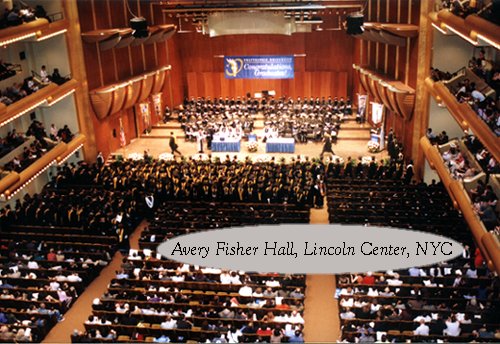
- Topics in class:
-
12th meeting - Wed., Nov. 13:
- 7th listening report due.
- Quiz due. align="right">
- New quiz handed out. 90-minute take-home closed-book quiz on "Annals of Architecture: A Better Sound," by Bruce Bliven, Jr., The New Yorker magazine, Nov. 8, 1976. Due beginning of 14th meeting.
- Topics in class
- Play two students' two-minute recordings.
- Regarding New Yorker article: Define Reverberation time. Decay curve is a graph of what versus time? How does this time-curve relate to something happening in space? What were the sonic faults of the old hall in the article? What were additional faults from musicians' point of view? Would the acoustician in the article prefer a single deep balcony or two shallow balconies? Multiple balconies vertically spaced wide apart or close together?
- In our thought-experiment of improving our local auditorium, identify the various acoustical solutions that might be useful, and suggest how each might be implemented.
-
13th meeting - Fri., Nov. 15:
-
Topics in class:
- Hear student recordings.
-
14th meeting - Wed., Nov. 20:
- 8th and last listening report due.
- Quiz due.
- Sound-level measurements due. (See 3rd meeting, above.)
- Topics in class:
- Hear student recordings.
- Project ideas/plans for next term?
- Fri., Nov. 22: No class meeting: Thanksgiving.
-
15th meeting - Wed., Nov. 27:
- Listening report due if eight have not been submitted.
- Topics in class:
- Hear student recordings
- How evaluate audio gear? (See the writeups of these topics under headings #2 and #3 at the linked page. See also my article "Rules of the Game."
- By listening? How listen? Explain "direct feed," "double-blind." Why one at a time?
- By measuring? How establish that a measurement is legit? (Show BBC double-comb-filter graphs) By showing correlation with perception.
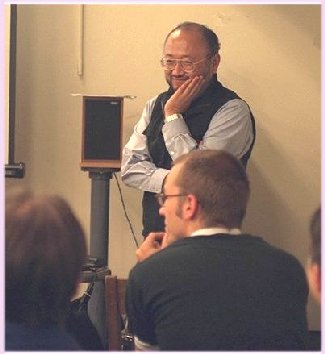
In the Music Lab, Mr. Yasuhisa Toyota tells the class about his design for the Disney Hall in Los Angeles. -
16th meeting - Wed. Dec. 4:
- Eight listening reports submitted and OK'd.
- Listening Skill II
- On music of your choice, tell when the volume changes by 3 dB (± 1 dB). (Some people find this easier than the 10 dB test.)
- Listening Skills III
- Absolute volume levels: Identify three levels within 5 dBA.
- Identify as "single-mike" or "multi-mike" an excerpt from the Lp's of "The Art of Fuguing."
- Topics in class:
- Listening test methodology, Validation of measurements against listening. (Continued from 15th meeting.)
- Listen to two-minute recordings.
- Fill out Division feedback forms.
-
17th (& Final) meeting - Fri. Dec. 6:
- Topics in class:
- Finish listening to two-minute recordings. Award prizes to three chosen by class vote.
- Discussion: Looking back on this term.
- Topics in class:
Writing assignments are given an upper limit of length to encourage writing which is succinct, and therefore good. After the 4th meeting, all assignments must be submitted with line length between 40 and 45 characters. (Using a non-proportional font is helpful.)
Passing-scores on perceptual tests are set so that, when you look back on the course in future days, you will be convinced that you did acquire the perceptual skill in question.
Two-sentence listening reports. Eight are due in the term. The first one is due at the 2nd meeting, and four must be submitted by the 8th meeting. Each week, listen to 60 minutes of live, unamplified music. Write two sentences saying whom you heard, playing what pieces, on what instruments, in what place; and making one or more observations about the sound as it reached your ears. (We'll discuss this in class.)- The music must be purely acoustic.
- You must not be the performer.
- Two reports must be based on complete concerts. It's your responsibility to find these. I will announce ones I know of.
- Two must be based on any of my Wed. afternoon "Alive with Music!" sessions in Dabney Lounge. (4:30 to 6:00 PM every Wed. starting the day of the 1st meeting, but occasionally ‘bumped.') If you have an activity which conflicts with this, see me.
- Reports will be returned with a note saying either "OK #1" (for instance) or "Rewrite." Rewrites are due at the next class meeting & must be stapled to the original report with has my comments on it. Keep all returned reports and other course materials.
- Two reports can count as three! You can write a double report (four sentences) about a concert and one of its rehearsals (e.g., Pasadena Symphony rehearsal and concert; see under "Field Trips," below); or about the same performance heard in two different halls (e.g., Caltech-Oxy Orchestra in Ramo Auditorium at Caltech and in Thorne Hall at Oxy), or about two performances of the same concert in the same hall. Any such pair counts for three. This is to encourage you to make listening comparisons, because comparisons focus perception.
Group project
Starting from a recording of good audio quality, listen to and describe the degradations arising from the processing in a FM broadcast signal chain; e.g., "dynamic compression" and "limiting." What negative effects are created by each? Write a group paper on this. (If we cannot borrow the equipment for this, we'll do a different project.)
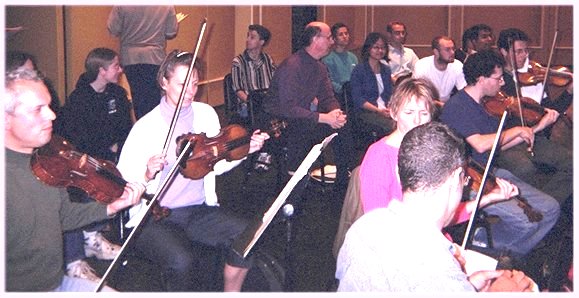
The class was disposed in various places about the stage at the Pasadena Symphony rehearsal. Also see picture at top.Field Trips
- Pasadena Symphony Rehearsal. Meet at 7:05 p.m. sharp, Pasadena Civic Auditorium, 300 East Green St; "artist entrance" on east side of building. There's parking on the street; at meters in the mall on other side of Green Street (that is, between Green and Colorado); or in the structure under the auditorium for a charge (last year $7). To find the latter, turn south on Euclid from Green. (Remember that Green is one-way eastbound, so you have to approach from Marengo, the next street west of Euclid. Turn off Euclid into the driveway with the Sheraton sign, then take a right into the lot. Students pay their own parking costs; if this is a problem, do not hesitate to see me privately or email to me. Confidentiality guaranteed. Once inside the Auditorium, remember to sign the attendance sheet; to be silent during rehearsal; to listen!; to be careful jumping down from stage (note protruding rail a foot below edge of stage); and to sit in two different places in the hall, at least one of them not under the balcony. We will stay until the break in the rehearsal ('til about 9 p.m., that is) and will chat during the break, after which we're done (but you may stay if you wish).
- Royer Labs, makers of ribbon microphones: Not definite yet.
- The Mastering Lab, Hollywood, to meet Mr. Doug Sax: This traditional field trip will not take place this year.
Further reading by JB (not required):- "On Both Sides of the Microphone," The Audio Amateur, issue 1, 1986.
How musical considerations affect technical decisions in recording. - "The Perfectly Complete, Completely Perfect, Thinking Person's Guide to Stereo," New West, Sept. 11, 1978.
Choosing stereo equipment by critical listening. How to "add up virtues" to draw valid conclusions about sound quality in uncontrolled environments. Pitfalls of the retail audio scene. Finalist in the National Magazine Awards. - "The Endangered Piano Technician," Scientific American, December, 1995. Reprinted in Piano & Keyboard, May-June, 1996.
The cultural crisis caused by the scarcity of fine concert piano technicians. - "10 Feet, 1¼ Inches." Los Angeles Times Magazine, Oct. 1, 1995.
Playing the world's longest piano, the Fazioli F-308.
Copyright © James Boyk 1991-2001